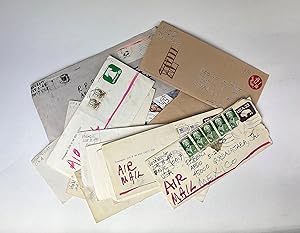Beschreibung
"Penthouse is working on an article about things people think are better than fucking. They asked me, and I told them about eating frozen blueberries from wild bushes in northern Finland. They were like sherbert, and better than fucking anyday." (Letter, January 5, 1978) "Here it is Christmas eve again, and I have failed again to persuade a wife that Jesus was born tonight and not tomorrow morning […] I ask them: Were the Wise Men wearing pajamas and rubbing sleepers out of their eyes and waiting for the coffee to perk?" (Letter, December 24, 1987) "I find it painful to read the in-depth truths about my friend John Cheever. I would rather not know. As my life nears its end, I suppose I could write a sort of Movable Feast, but that would be like Captain Kangaroo's suddenly turning into a rattlesnake." (Letter, November 25, 1991) "Thank goodness you and Ollie and Phil are still around. Practically everybody I ever cared about is dead now. I never expected to put my own generation to bed. Now the funerals I go to are for their children." (Letter, March 2, 1999) Kurt Vonnegut and Robert Poindexter Pace both grew up in Indiana, attending the same High School (two years apart), and later serving in the military during World War II (Vonnegut's experiences in Europe were later quarried for Slaughterhouse-Five (1969)). The two men didn't meet, however, until after the war when they both found themselves working in the offices of General Electric in Schenectady, New York. Vonnegut, after a spell at the University of Chicago on the G.I. Bill (having previously withdrawn from Cornell for military service), was employed as a technical writer and publicist, obtaining the job with the help of his older brother, Bernard, already at GE. He liked the job, and a handful of the men he worked with during these years, chiefly Pace, became lifelong friends. In his biography of Vonnegut, Charles Shields remarks that he was fond of the "maleness" and "camaraderie" of the office, and these letters to Pace are correspondingly unrestrained. Vonnegut clearly loves his old friend and feels able to write anything, however rude, personal, or solemn. The particular bond with Pace may owe something to their shared background (in one letter, Vonnegut addresses Pace as his "Dear old Hoosier buddy, dear Bob"; Hoosier, a demonym for the people of Indiana), allowing Vonnegut to reminisce freely about his father (for example), an architect whose buildings in Indiana were familiar to Pace. In June 1976, responding to a newspaper cutting sent by Pace reporting that the architect Evens Woolen was living in Vonnegut Sr's self-designed house, Vonnegut writes: "It is sweet to me that [Woolen] lives in the best thing my father was ever allowed to do, his own home. My old man never had a client who would let him express anything he himself believed. He was bitter at the end, and even toward the middle, come to think of it. Hi ho." In 1994, he returns to the subject (and the house): "Yours of March 29 discovered me returning from a visit to Indianapolis and Culver, both of which have been neutron bombed. The buildings still stood, but the people were gone. The most interesting building my father ever designed, our house at 44th and Illinois, to which I bade farewell when I was 10, is a frequent stop on house tours now. It still has my parents' monograms in the leaded glass window in the front door. My daughter Nanny Prior, now 39, was with me. She cried when she saw the monograms. I didn't … I may have become a sociopath." ~ Failing health is a running theme (always, however, animated by Vonnegut's wit). The earliest, and shortest, letter here, dated January 23 1974, refers to Pace's recent back injury ("That's horrible news about your back"), and encourages his friend to keep in touch ("I would love to hear from you often, have Jill [Vonnegut's partner, and later wife] feed you from time to time, and help you to get a big money job, if you want one."). Pace seems to have ha. Bestandsnummer des Verkäufers 22918
Verkäufer kontaktieren
Diesen Artikel melden
![]()



